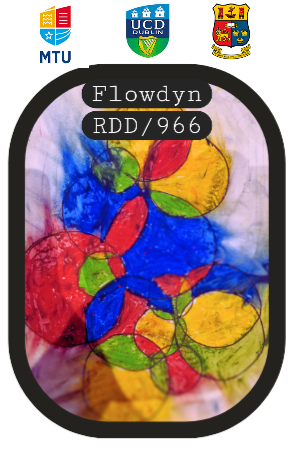News and Events
- UCD Engineering Spin-out Secures €6 Million to Accelerate Development of Groundbreaking Blood Flow Tech
- CDIC Automotive Design Competition 2024
- Teaching and Learning Awards
- Aisling Ní Annaidh recognised as a pioneer in her field through an ERC Consolidator Award
- Highly Cited: UCD researchers named amongst 2024’s most influential
- ESTEEM Graduate Programme
- Scientists’ next-generation space materials blast off for tests on ISS
- Competition! Celebrating John Stewart Bell’s Legacy
- Minister O’Donovan announces €26million for 40 research projects
- Engineering Class of 1958
- Professor Anding Zhu elected IEEE MTT-S President
- Bridges and Bytes – Launching the Student Voice on AI and Assessment
- European Research Council Funds Cutting-Edge Irish Research into Microplastics and Traumatic Brain Injury
- Professor Finola O'Kane appointed as a Senior Fellow at Dumbarton Oaks
- SBFE research fellow Xiaohui Lin receives the MSCA DOROTHY COFUND award
- Upskill with UCD’s engineering micro-credentials
- Minister O’Donovan announces funding boost for early career researchers
- Recent Lab visit by UCD Engineering & Architecture to Sheffield University Diamond Centre
- UCD Stormwater Runoff Research featured in Nicola Haines Team
- Madeleine Lowery among UCD Researchers recognised in SFI Frontiers for the Future Awards
- UCD’s LaNua Medical Wins Big Ideas Award at Enterprise Ireland’s Start-Up Day 2024
- Robotics Competition
- Congratulations to All the Winners of this years NovaUCD Awards
- Irish National Doctoral Research Cohort on Floating Offshore Wind Dynamic Cables is formed
- UCD and Northeastern University extend and deepen long-standing partnership with five collaborative research projects
- EPA announces €14.3M in new research funding
- Arup Scholarship Awards 2024
- UCD names new Vice-President for Equality, Diversity and Inclusion
- Project promoting safe staffing in the healthcare system wins UCD Research Impact Competition
- VOICE Project Launches to Shape Tomorrow's Sustainability
- Archives
Irish National Doctoral Research Cohort on Floating Offshore Wind Dynamic Cables is formed
Wednesday, 27 March, 2024
 Sustainable Energy Authority Funded Project FlowDyn RDD/966 on Floating Offshore Wind Dynamic Cables brings together the largest group of researchers around this topic in Ireland and the first national doctoral research cohort. This timely project addresses robust and niche training around the current and future needs in renewable energy, with a focus on offshore wind and collaborates extensively with academic and industry within and outside Ireland in a strategic manner, to deliver maximum impact.
Sustainable Energy Authority Funded Project FlowDyn RDD/966 on Floating Offshore Wind Dynamic Cables brings together the largest group of researchers around this topic in Ireland and the first national doctoral research cohort. This timely project addresses robust and niche training around the current and future needs in renewable energy, with a focus on offshore wind and collaborates extensively with academic and industry within and outside Ireland in a strategic manner, to deliver maximum impact.
The project is overall led by Vikram Pakrashi, University College Dublin and comprises of University College Dublin (UCD), Munster Technological University (MTU) and University College Cork (UCC). “FlowDyn allows us to demonstrate how fundamental ideas with rigour can be assimilated with industrial needs of the time in an interdisciplinary manner”, says Vikram, who is also the Director of UCD Centre for Mechanics and the lead of Offshore Wind strand of Science Foundation Ireland funded NexSys project.
“Dynamic Cables are one of the key elements that allows offshore wind power back to land. It is also one of the more vulnerable elements, leading to more frequent failures with large consequences around power generation and uncertainty around them. Overall, there is a strong need to better understand flexible cables in the marine environment in terms of materials, design and lifetime performance. ” adds Vesna Jaksic, research lead from Munster Technological University.
“Addressing the challenges of dynamic cables is difficult due to the fundamental complexity of these cables not just in terms of their modelling but also in terms of lack of evidence in testing and monitoring in controlled and natural environments. We should try and close this gap between fundamental insights in this area and having adequate tools at hand to eventually absorb them into industrial practice.”, says Jimmy Murphy, the research lead from University College Cork.
FlowDyn approaches these challenges by creating a doctoral cohort of six researchers to understand complex static and dynamic responses of these cables over their lifetime exposure conditions, failures, monitoring, design, control and other challenges. The idea is to concurrently create fundamental insights, authoritative numerical/experimental tools and benchmarks while demonstrating best practices for industrial adaptation, as well as for doctoral research.
“FlowDyn is privileged to have some of the best researchers in Ireland to address this topic at various stages of their career. This includes (opens in a new window)Kevin Nolan (UCD) in experimental fluid dynamics, (opens in a new window)Mert Celikin (UCD) in experimental material science, (opens in a new window)Abdollah Malekjafarian (UCD) in monitoring, (opens in a new window)Aasifa Rounak (UCD) in fundamental nonlinear dynamics, (opens in a new window)Philip Cardiff (UCD) and (opens in a new window)Alojz Ivankovic (UCD) in computational mechanics for solids/fluids, (opens in a new window)Jennifer Keenahan (UCD) in computational fluid dynamics modelling, (opens in a new window)Rui Teixeira (UCD) in probabilistic engineering mechanics, (opens in a new window)Jimmy Murphy (UCC) in wave basin testing and offshore engineering, and (opens in a new window)Vesna Jaksic (MTU) in structural engineering and design of offshore and composites. I think it will be an amazing experience for the new researchers working with this team and with each other., concludes (opens in a new window)Vikram Pakrashi.